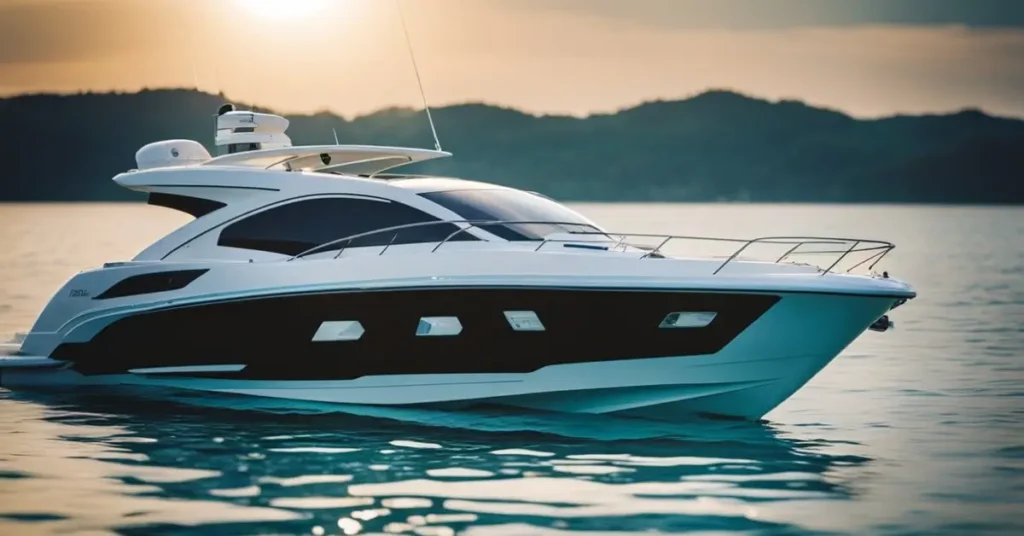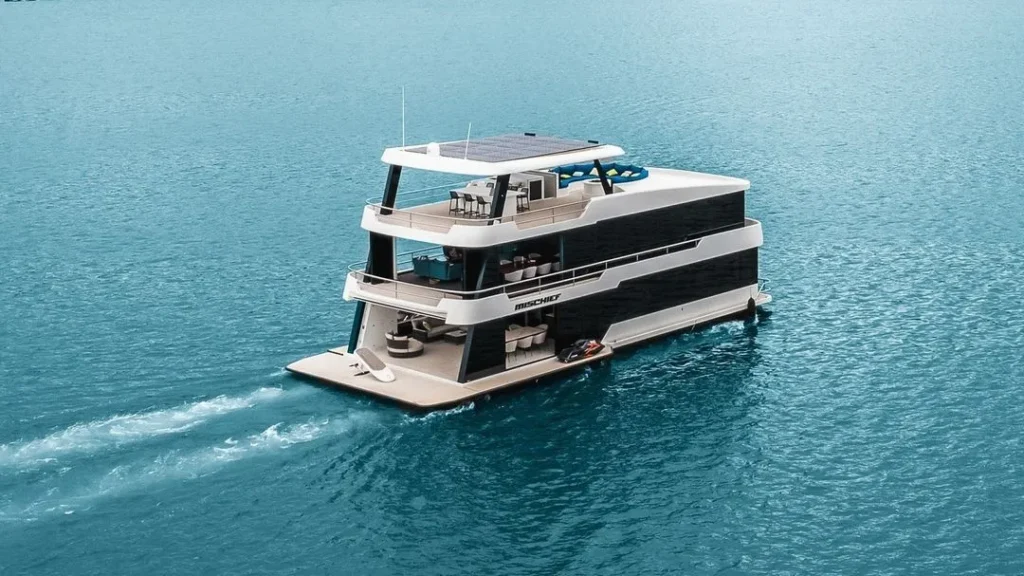Can you live on a boat? Absolutely! More people are embracing the alternative lifestyle of living on a ship to experience freedom, adventure, and a closer connection to nature. Boat living offers many unique benefits, but it also comes with its fair share of challenges that one must be prepared to face.
As liveaboards, we understand the allure of the boat lifestyle, the freedom of open waters, and the joys of waking up to stunning sunrises. However, it’s crucial to acknowledge the importance of preparation, organization, and adaptability to master this way of life successfully. We’ll share our insights and valuable information we’ve found in our research to help you determine if living on a boat is the right choice for you.
Types of Liveaboard Boats
Many people wonder- can you live on a boat? The answer is yes, and various ships can accommodate full-time living. This section will briefly explore popular liveaboard boat options such as sailboats, houseboats, catamarans, trawlers, and tugboats.
Sailboat
Sailboats come in many sizes and designs, making them one of the most popular choices for liveaboard enthusiasts. Sloops, for example, are sailboats with a single mast and two sails that one or two people can easily handle. Sailboats offer a more adventurous lifestyle than other boats, as they rely on the power of the wind to propel them through the water.
- Pros: Eco-friendly, adventurous, and suitable for solo living
- Cons: Requires sailing skills, limited space, and can be weather-dependent
Houseboat
Houseboats are explicitly designed for living on the water, making them another popular choice. They come in various shapes and sizes, some of which can be classified as floating home houseboats. Living on a houseboat offers a more traditional living experience than other boat types.
- Pros: Comfortable living spaces, often spacious, and easier to navigate than sailboats
- Cons: Limited mobility, may require a mooring spot, and potentially higher maintenance costs
Catamaran
Catamarans are a type of sailboat with two parallel hulls, providing more stability and living space than monohull sailboats. They are known for their versatility, as they can be customized to accommodate various needs and preferences.
- Pros: Increased stability, more living space, and good sailing performance
- Cons: Higher initial cost, can be challenging to maneuver in tight areas, and not all marinas can accommodate them
Trawler
Trawlers are motor-powered boats designed for long-distance cruising, often featuring enclosed living areas and spacious cabins. They offer many amenities and can be an excellent option for those who prefer a motorboat over a sailboat.
- Pros: Comfortable accommodations, low fuel consumption, and can be navigated in various weather conditions
- Cons: Higher initial cost, less eco-friendly, and may require a captain’s license to operate
Tugboats
While less common for living aboard, tugboats can be converted into comfortable liveaboard vessels. These boats offer a unique living experience for those interested in a more robust and durable boat.
- Pros: Sturdy, spacious, and can handle rough waters
- Cons: Limited availability of suitable tugboats, may require extensive conversion, and higher operational costs
You can find the perfect boat to live on among these popular liveaboard options by considering your individual needs and preferences.
Cost Considerations

So, you’ve been wondering if you can live on a boat. The first question that might pop into your head is, what are the costs involved? This section will discuss the primary cost considerations associated with boat living.
Initial Purchase
The initial purchase price is the most obvious cost of living on a boat. Whether you choose a sailboat, motor yacht, or houseboat, prices vary widely based on size, age, and condition. Before taking the plunge, it’s essential to set a budget and research the types of boats that fit your needs and price range.
- Sailboats: $20,000 – $200,000+
- Motor Yachts: $50,000 – $1,000,000+
- Houseboats: $30,000 – $500,000+
Note: These are approximate price ranges and can vary significantly.
Maintenance Costs
Owning a boat requires regular maintenance, which can add up over time. Here are a few standard maintenance expenses:
- Cleaning and painting: Occasional cleaning and painting are necessary to prevent corrosion and buildup on the hull.
- Engine maintenance includes oil changes, filter replacements, and other engine-related tasks.
- Sail and rigging: Sailboats may require repairs or replacements for their sails and rigging system.
- Equipment and electronics: Regular servicing and replacing navigation systems, safety gear, and other equipment are essential.
Slip Fees
When living on a boat, you’ll likely need to pay for a slip at a marina. Slip fees vary depending on location, size of the ship, and amenities offered by the marina. Depending on your location, expect to pay anywhere from $200 to $2,000 monthly.
Utilities and Other Monthly Expenses
In addition to the slip fees, other monthly expenses may include:
- Utilities: Most marinas charge for electricity and water usage based on your actual consumption.
- Boat insurance: Insurance rates depend on the type, size, and value of your boat, as well as the region you live in. Generally, boat insurance can range from $300 to $1,000+ per year.
- Waste management: Pump-out services or on-shore facilities may be required to handle sewage disposal.
- Water maker: Installing a water maker could be beneficial for creating potable water from surrounding water sources.
Tracking these expenses and creating a budget for living on a boat is critical to avoid unexpected financial surprises. Researching regional costs specific to your chosen marina and location can help you plan your new boat life adventure more accurately.
Living Conditions and Space Management

So, can you live on a boat? Let’s dive into the living conditions and space management aspects of being a liveaboard.
Space Optimization
Living on a boat often means limited space. To make the most of it, we recommend optimizing storage and organization. Use multifunctional furniture, such as a bed with built-in storage or a foldable table. Maximize vertical space with shelves and wall-mounted storage.
Keep only essential items, as your boat will not have room for excessive belongings. If you plan on having pets on board, ensure they have their essentials, too. The key here is to maintain a clutter-free and organized environment.
Cooking and Meal Preparation
Cooking on a boat is different than on land. Most liveaboard boats have compact kitchens, so it’s essential to be organized and creative when preparing meals. You’ll have to make frequent trips to the grocery store, as there will be little room for stocking up.
Additionally, you might have to get used to a smaller stovetop or limited appliances, like compact ovens or microwaves. Here are some tips for cooking on a boat:
- Please keep it simple with one-pot meals and fresh ingredients.
- Use stackable and collapsible cookware to save space.
- Plan meals to minimize food waste and storage needs.
Laundry and Waste Management
Living on a boat, laundry, and waste management can be more challenging. Consider compact options like a manual laundry plunger or a portable washing machine to handle laundry. Many marinas offer laundry facilities if you prefer a more traditional approach.
Waste management is crucial in maintaining a healthy living environment. Boat insurance and waste management services might be part of your regular expenses as a liveaboard. Always dispose of waste properly, separating recyclables and compost whenever possible. Use reusable containers and shopping bags to minimize packaging waste.
In conclusion, living on a boat involves optimizing your space and adapting your household routines. Being mindful of your belongings and efficient in daily tasks will make the experience more enjoyable and sustainable.
Choosing the Right Marina and Location

So, Did you ask yourself, can you live on a boat and have decided to try it? Now, it’s time to choose the right location and marina for your new life as a liveaboard. We’re here to help guide you through the essential considerations when selecting a marina and the best places to live aboard a boat. Let’s dive in!
Liveaboard Marinas
Your quality of life on the water is highly dependent on where you decide to drop your anchor. Liveaboard marinas provide numerous facilities and amenities for boat owners. Some things to consider include the availability of restroom and shower facilities, nearby shops for provisioning, and access to public transportation. Security should also be paramount; you’ll want to feel safe living on your boat.
- Pros: Access to resort-level perks, modern facilities, and a support community of fellow boaters.
- Cons: It can be expensive, especially in high-demand areas. Plan and budget accordingly.
Best Places to Live Aboard a Boat
There are several ideal locations across the US for those looking to live aboard a boat. Here, we’ll highlight three cities to consider:
- Chesapeake Bay, Maryland – This marine wonderland offers a vast selection of marinas and a rich boating community. Living here, you’ll find ample fishing opportunities and beautiful scenery. Annapolis, Baltimore, and Virginia Beach are nearby, providing cultural and entertainment options for you and your family.
- Corpus Christi, Texas – Known for its abundant sunshine and friendly locals, Corpus Christi is another excellent choice for liveaboards. The city boasts several suitable marinas and lower costs than more popular areas. A bonus: the proximity to some of the best fishing spots in the Gulf of Mexico!
- San Francisco, California – The iconic city by the bay offers a unique and exciting liveaboard experience. However, the steep living costs in San Francisco may deter some potential liveaboards. For a more budget-friendly option, check out the nearby Oyster Point Marina in San Francisco Bay, where monthly costs are reportedly around $350 plus a $200 liveaboard fee.
As you start this new phase of your life, remember that the marina and location you choose should match your needs and lifestyle. Assess the pros and cons of each area, and consider the amenities you need to keep your family comfortable and happy while living on a boat. Good luck, and happy sailing!
Our Opinion – Can you live on a boat?
In our view, Living on a boat full-time is possible but requires adjusting to a much smaller living space and a different lifestyle. Boats don’t offer the same living area as a standard home, so you’ll need to get very good at minimizing possessions.
That said, it can be advantageous for those looking for an alternative to traditional land living and who enjoy activities like sailing, fishing, and being close to the water. It would be best if you went into it with realistic expectations about the compromises involved, like limited storage, motion of being on the water at all times, and higher maintenance and marina fees costs.
If you value the freedom and mobility of living wherever your boat can take you, living on a ship, long-term, can undoubtedly be done for the right personality types.
FAQ – Can You Live on a Boat?

As avid boating enthusiasts, we often get asked, “Can you live on a boat?” This FAQ section will address common questions about living on a boat and provide quick and concise answers for You.
Is it realistic to live on a boat?
Yes, living on a boat is realistic, and many people worldwide enjoy this alternative lifestyle. However, being well-prepared, organized, and adaptable to the challenges of living aboard your boat is essential.
Moving aboard requires a commitment to simplifying your lifestyle and maintaining the ship. It’s vital to make checklists of necessities and discuss any potential deal-breakers with your partner. Consider reading this Beginner’s Guide for Liveaboards for an in-depth guide on living aboard.
Can you live permanently on a boat?
You can live permanently on a boat, but only some marinas allow you to live aboard with varying charges and rules. Some marinas have multi-year waitlists for obtaining a slip, which you should consider before committing to living permanently on a boat. For more information on what to know before making the move, check out Boater Pal.
Can you live on a boat you own?
Living on a boat, you own is possible and offers increased flexibility regarding where you can dock or anchor for extended periods. However, it’s essential to know the laws and regulations of living aboard your vessel. You must register your boat with the Coast Guard, maintain its seaworthiness, and have all necessary safety equipment on board. Learn more about the legal aspects of living on your boat at BoatingWorld.
How long can you live on a boat at sea?
The duration you can live on a boat at sea predominantly depends on your supplies and the boat’s capabilities. It’s important to carefully plan for essentials such as food, water, fuel, and other necessities and monitor your resources while at sea.
Some experienced sailors have successfully lived on their boats for weeks or months. Remember that certain factors such as weather, navigation, and boat maintenance can significantly influence your time at sea—planning and preparation are crucial.
Our article covered the Question, “Can you live on a boat?” – but what about Your Opinion? Share your Experiences, Dreams, or questions in the comments below.



